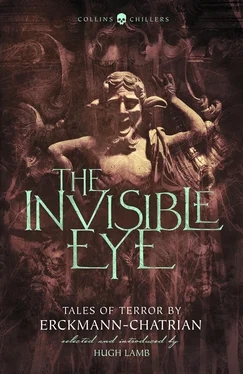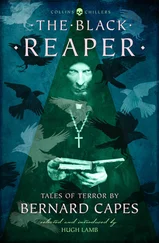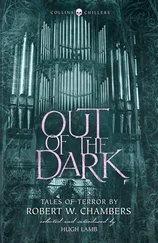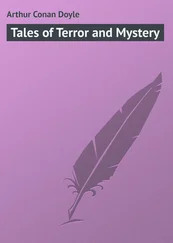1 ...7 8 9 11 12 13 ...23 ‘Well, M. Magistrate, what do you want?’
‘You would do well to put to the shutters. Believe me, this storm will wind up with some thunder.’
The innkeeper went out and put the shutters to, and the old magistrate, sitting down in his corner, heaved a deep sigh.
‘You know what has happened, burgomaster?’ he asked in a solemn voice.
‘No. What has occurred, my old Christopher?’
Before he replied M. Ulmett threw a glance around the room.
‘We are here alone, my friends,’ said he, ‘so I am able to tell you. About three o’clock this afternoon some one found poor Gredel Dick under the sluice of the miller at Holderloch.’
‘Under the sluice at Holderloch?’ cried all.
‘Yes; a cord round her neck.’
In order to understand how these words affected us it is necessary that you should know that Gredel Dick was one of the prettiest girls in Vieux-Brisach; a tall brunette, with blue eyes and red cheeks; the only daughter of an old anabaptist, Petrus Dick, who farmed considerable portions of the Schlossgarten. For some time she had seemed sad and melancholy – she who had beforetime been so merry in the morning at the washing-place, and in the evening at the well in the midst of her friends. She had been seen crying, and her sorrow had been ascribed to the incessant pursuit of her by Saphéri Mutz, the postmaster’s son – a big fellow, thin, vigorous, with an aquiline nose and curling black hair. He followed her like a shadow, and never let her off his arm at the dances.
There had been some talk about their marriage, but old Mutz, his wife, Karl Bremer his son-in-law, and his daughter Saffayel, were opposed to the match, all agreeing that a ‘heathen’ should not be introduced into the family.
For three days past nothing had been seen of Gredel. No one knew what had become of her. You may imagine the thousand different thoughts which crowded upon us when we heard that she was dead. No one thought any longer of the discussion between Theodore Blitz and the engineer Rothan touching invisible spirits. All eyes were fixed on M. Christopher Ulmett, who, his large bald head bent, his heavy white eyebrows knit, gravely filled his pipe, with a meditative air.
‘And Mutz – Saphéri Mutz?’ asked the burgomaster. ‘What has become of him?’
A slight flush coloured the cheeks of the old man as he answered, after some seconds of thought: ‘Saphéri Mutz? He has gone.’
‘Gone!’ cried little Klers. ‘Then he acknowledges his guilt?’
‘It certainly seems so to me,’ said the old magistrate simply. ‘One does not scamper off for nothing. As for the rest, we have searched his father’s place, and found all the house upset. The folk seemed struck with consternation. The mother raved and tore her hair; the daughter wore her Sunday clothes, and danced about like a fool. It was impossible to get anything out of them. As to Gredel’s father, the poor fellow is in the deepest despair. He does not wish to say anything against his child, but it is certain that Gredel Dick left the farm of her own accord on Tuesday last in order to meet Saphéri. The fact is attested by all the neighbours. Now the gendarmes are scouring the country. We shall see, we shall see!’
Then there was a long silence. Outside the rain fell heavily.
‘It is abominable!’ cried the burgomaster suddenly. ‘Abominable! To think that every father of a family, even such as bring up their children in the fear of God, are exposed to such misfortunes.’
‘Yes,’ replied Ulmett, lighting his pipe. ‘It is so. They say, no doubt rightly, that heaven orders all things; but the spirit of darkness seems to me to meddle a good deal more than is necessary in them. For one good fellow how many villains do we find, without faith or law? And for one good action how many evil ones? I tell you, my friends, if the Evil One were to count his flock—’
He had not time to finish, for at that moment a terrific flash of lightning glared in through the chinks of the shutters, making the lamp burn dim. It was immediately followed by a clap of thunder, crashing, jerky – one of those claps which make you tremble. One might have thought that the world was coming to an end.
The clock of the church of Saint-Landolphe just then struck the half-hour. The tolling bells seemed to be just hard by one. From far, very far off, there came a trembling plaintive voice, crying: ‘Help! Help!’
‘Some one cries for help,’ said the burgomaster.
‘Yes,’ said the others, turning pale, and listening.
While we were all thus in fright, Rothan, curling his lips in a joking fashion, broke out: ‘Ha! ha! ha! It is Mademoiselle Roesel’s cat singing its love story to Monsieur Roller, the young first tenor.’
Then dropping his voice and lifting his hand with a tragic gesture, he went on: ‘The time has sounded from the belfry of the chateau!’
‘Ill-luck to those who laugh at such a cry,’ said old Christopher, rising.
He went towards the door with a solemn step, and we all followed him, even the fat innkeeper, who held his cotton cap in his hand and murmured a prayer very low. Rothan alone did not stir from his seat. As for me, I was behind the others, with outstretched neck, looking over their shoulders.
The glass door was scarcely opened when there came another flash of lightning. The street, with its white flags washed by the rain, its flushed gutters, its multitude of windows, its old gables, its signboards, glared out from the night, and then was swallowed up in the darkness.
That glance of the eye allowed me to see the steeple of Saint-Landolphe with its innumerable little carvings all clothed in white light. In the steeple were the bells hanging to black beams, with their clappers, and their ropes hanging down to the body of the church. Below that was a stork’s nest, half torn in pieces by the wind – the young ones with their beaks out, the mother at her wits’ end, her wings extended, while the male-bird flew about the shining steeple, his breast thrown forward, his neck bent, his long legs thrown out behind as if defying the thunder peals.
It was a strange sight, a veritable Chinese picture – thin, delicate, light, something strange, terrible, upon a black background of clouds broken with streaks of gold.
We stood, with open mouths, upon the threshold of the inn, and asked: ‘What did you hear, M. Ulmett? What can you see, M. Klers?’
At that moment a lugubrious mewing commenced above us, and a whole regiment of cats set to work springing about in the gutter. At the same time a peal of laughter filled the room—
‘Ah well! ah well!’ cried the engineer. ‘Do you hear them? Was I wrong?’
‘It was nothing,’ murmured the old magistrate. ‘Thank heaven, it was nothing. Let us go in again. The rain is recommencing.’
As we took our places again, he said: ‘Is it astonishing, M. Rothan, that the imagination of a poor old fellow, such as myself, goes astray at a time when earth and heaven confound themselves, while good and bad are struggling together, while such mysterious crimes occur around us even at this day? Is it strange?’
We all took our places with a feeling of annoyance with the engineer, who had alone remained quiet, and had seen us disconcerted. We turned our backs on him as we emptied our glasses without saying a word, while he, his elbow on the edge of the window-ledge, hummed between his teeth I know not what military march, the time of which he beat with his fingers on the ledge, without deigning to notice our ill-humour.
So things went on for some minutes, when Theodore Blitz said laughingly: ‘Monsieur Rothan triumphs. He does not believe in invisible spirits. Nothing troubles him. He has a good foot, good eye, and good ear. What more is wanting to convict us of ignorance and folly?’
Читать дальше












